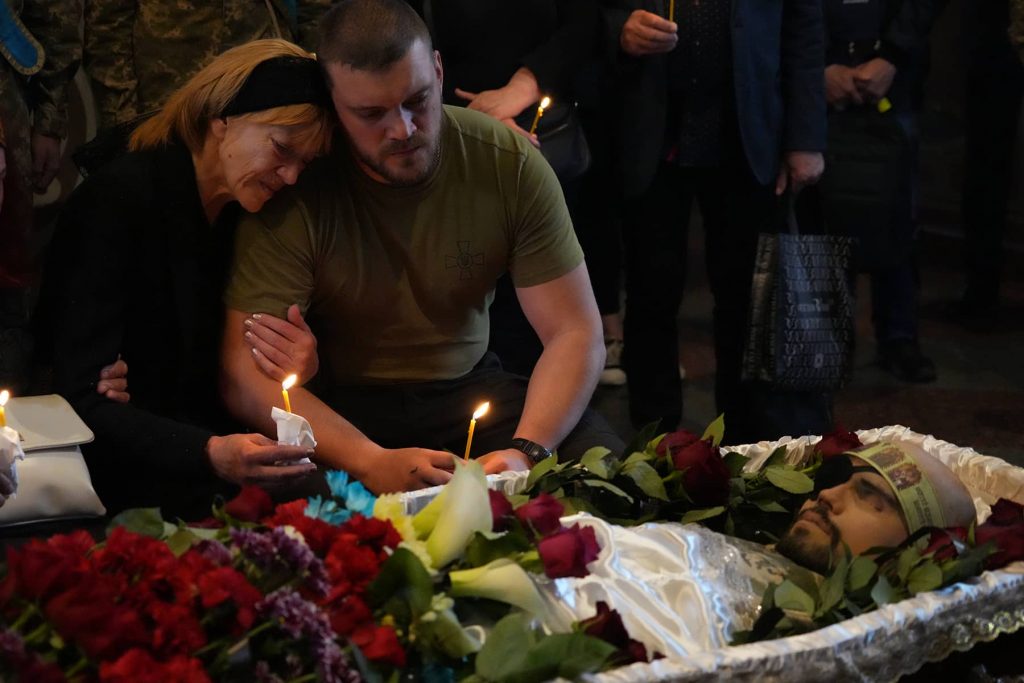
“Day after day for the past nine years, we crafted every urgent plea possible to persuade them: appealing to their intellects and their hearts and their humanity and their patriotism. They told us we were exaggerating, we were overreacting, that we were drifting into melodrama or delusion, that the doom we were forecasting was a fabrication of our minds, that such grim realities were virtual impossibilities. ‘The sky is not falling, Chicken Little.’ they said. ‘You need to relax.’ And now…” – John Pavlovitz
Life in a politically charged era can feel like you are constantly standing at the edge of a wildfire. The world seems to burn around you. Social media is flooded with outrage, public figures goad each other with reckless abandon, and policies unfold that threaten the well-being of communities near and far.
When individuals – who once dismissed urgent warnings – now find themselves pleading for assistance, it can provoke more than a little bitterness. It can make you wonder: Why should I keep caring when I’m tired, overwhelmed, and dealing with selfish people who only started to care when something finally impacted them?
This question grows heavier when the political climate is tense, as it was for many Americans during Donald Trump’s first presidency. Yet the broader debate remains the same: How do we continue to care in a world that often does not seem to care back?
THE OVERWHELMING WEIGHT OF COMPASSION
First, recognize the emotional toll that empathy can exact on individuals who feel compelled to “save the world.” Compassion fatigue is real. The modern onslaught of news, largely driven by Trump for the explicit purpose of overwhelming and disenfranchising the public so they will not stand up to stop his crimes in office, demands our constant attention – seemingly at every hour.
With so many urgent issues competing for awareness, some people end up in a perpetual state of vigilance, worried that if they do not act, something terrible will befall neighbors, coworkers, or strangers. Yet carrying that weight can lead to burnout.
If you have ever felt yourself at the end of your rope, wondering why others are not pulling their own weight – or even actively making problems worse – you are not alone. It is common to experience anger or disillusionment, especially when confronted with the selfishness of those who refuse to help themselves or others.
They might scream for personal freedoms and then, when hardship inevitably comes, turn to those they previously criticized for support. The frustration is palpable: Why should I continue to care if they refused to listen or learn from past mistakes?
BETWEEN PERSONAL RESPONSIBILITY AND COLLECTIVE DUTY
Living through tumultuous political times demands a difficult balancing act. On one hand, there is a moral imperative to stay engaged. When you see an unjust policy that strips people of health care, empowers bullies to walk over civil liberties, or chips away at essential public services, it is natural to feel a pull to advocate, to protest, or to donate resources.
On the other hand, you may wonder whether stepping back is sometimes necessary for your own mental health. After all, you cannot pour from an empty cup.
Society tends to place extraordinary pressure on those who are known to be givers. Friends and family who have seen your kindness might implicitly expect you to continue giving, without pausing to ask if you have the capacity.
Certain communities develop a culture in which vocal activists or caregivers are lauded as heroes — until they are drained, at which point they may be quickly forgotten. The risk here is martyrdom, an unrelenting cycle of putting everyone else first while your own emotional resources dry up.
EVERYTHING IS ON FIRE
When it feels like everything is on fire — politically, socially, or culturally — your sense of helplessness can amplify. There might be hundreds of issues you care about: immigration justice, racial equality, climate change, health care, workers’ rights, LGBTQ rights, education funding, and more.
Attempting to be fully informed and engaged with each one can create a sense of constant urgency, which can be mentally and physically exhausting. In times of extreme stress, it is natural to feel like throwing up your hands and saying, “I’ve done enough. I’m done.”
That reaction can be a self-defense mechanism, a way to ward off despair. There is no shame in needing to protect your mental well-being when the world feels overwhelming. But many empathetic individuals grapple with guilt if they disengage.
They might ask, “If I step back, who will fight for those who can’t fight for themselves?”
MORAL FATIGUE IN THE POLITICAL ARENA
This tension intensifies when you see a lack of accountability in national leadership, in someone like Trump and his cult-like MAGA enablers who used to be the Republican Party. Some of the frustration rests in the perception that Trump could enact far-reaching decisions with little regard for certain marginalized groups.
Supporters, in turn, are unwilling to engage in criticism of his destructive decisions. It can feel maddening to watch people endorse policies that appear detrimental to the very communities in which they live, only to demand help when the consequences hit home.
Citizens who recognize the urgent problems at hand might be labeled “alarmist” or told to stop complaining. Then, when those problems materialize — whether it is a delayed government response to a health crisis or the erosion of public services — those same critics may look for someone else to fix it.
THE PHILOSOPHICAL ARGUMENT FOR CONTINUED ENGAGEMENT
Philosophically, the decision to keep caring despite frustration rests on your values. Do you believe in a social contract, the idea that a society functions best when individuals work together for the common good? If so, stepping away entirely might clash with your sense of duty or identity.
Another angle is the concept of telos in classical philosophy, your ultimate purpose or the highest aim you strive for. If part of your purpose is to help others or to champion compassion, then living in alignment with that aim might require you to engage, even when it is painful. You might decide that quitting the struggle would mean ignoring an essential piece of who you are.
Yet this philosophical commitment does not mean you must be endlessly available. Boundaries are also philosophically coherent. You might deem it rational to preserve your emotional health so you can remain effective in the long run. The quest is to find balance, giving where you can, but not at the expense of your own sustainability.
THE SPIRITUAL ARGUMENT FOR COMPASSION AMID EXHAUSTION
Spiritually, many traditions teach that trials and tribulations are not merely obstacles but also opportunities for personal growth. In some interpretations of Christianity, suffering can serve as a crucible, refining both faith and character. In certain Eastern philosophies, hardship can be a chance to practice compassion, patience, and detachment from ego.
Regardless of religious affiliation, a common thread is that pain and discomfort can reveal deeper truths about what truly matters. If your spiritual belief – or guiding principle – is that love ultimately wins or that kindness is a path to enlightenment, you might feel called to persist in caring actions, even when others do not reciprocate.
However, spirituality also emphasizes self-care. In Buddhism, for example, there is the notion of skillful compassion, which includes compassion for oneself. If you allow yourself to be consumed by bitterness and anger, you risk losing the clarity and kindness that originally motivated you to help others.
CHOOSING HOW TO FIGHT — AND WHEN
Caring does not always mean being at every rally or volunteering for every cause. The state of the world can trick compassionate people into believing that they must respond to each crisis, otherwise they are somehow failing morally. Yet it is healthier and more sustainable to choose the battles that align most closely with your strengths and passions.
If you feel the urge to engage politically, perhaps focus on local initiatives where you can have a tangible impact. If you are disillusioned with national policy, look for smaller-scale projects — community gardens, school boards, neighborhood associations — that can show real results.
Grassroots efforts often provide immediate feedback and a sense of accomplishment, whereas national politics can feel like shouting into a void.
Similarly, if you find yourself drained by endless arguments on social media, consider stepping back. Redirect that energy into direct outreach—phone calls, emails, and conversations with neighbors or local officials. A personal connection can make a bigger difference than a thousand online comments.
EMBRACING IMPERFECTION AND COMPLEXITY
It is tempting to label everyone who disagrees with you as selfish or ill-informed, especially if they show up asking for help after they have contributed to the problem. But life is seldom so black-and-white.
The person who seems selfish might be operating from a place of deep fear or ignorance, shaped by their environment or upbringing. Understanding that does not excuse harmful behavior, but it can provide a measure of empathy that helps you avoid sliding into total cynicism.
You do not owe it to anyone to constantly accept mistreatment or shoulder burdens alone. However, practicing some degree of empathy — even toward those who refuse to learn until they are hurting—can preserve your own inner compass.
Helping, when it is safe and feasible, can sometimes create a moment of reflection for the individual who caused their own crisis. Perhaps they will not learn from it, but maybe they will — and that tiny possibility might be worth the effort if you have the capacity.
CONSERVING HOPE WITHOUT NAIVETE
There is a fine line between being hopeful and being naive. Hope does not require ignoring the world’s cruelty. It means acknowledging the worst realities while still believing in the potential for something better. If you give up entirely on hope, you may unintentionally become part of the cycle of destruction, choosing apathy when the world most needs principled action.
But hope must be grounded in clear-eyed realism. You can believe in the power of collective good while being honest about the fact that many people act from selfish interests. You can acknowledge your anger without letting it become your defining emotion. By striking this balance, you remain anchored, able to continue caring in ways that align with your personal capacity and well-being.
CARING IS A CHOICE, NOT AN OBLIGATION
Ultimately, deciding whether to keep caring in a world “on fire” is a personal matter. It is not your duty to extinguish every blaze. You did not start most of these fires, and you have already sacrificed much.
Yet if compassion is part of your moral code or spiritual belief, giving it up entirely may leave you feeling unmoored. A healthier approach might be to define your own boundaries. Where can I make the most difference without sacrificing my mental health? How can I engage with causes or communities I care about without losing myself in the process?
It is understandable to feel bitterness toward those who have created their own problems through ignorance or selfishness. Still, you may find solace in helping where you can — because you choose to, not because they demand it.
You are under no obligation to rescue everyone, especially those who have consistently refused to heed warnings. But in continuing to fight for what you believe is right, and helping those who genuinely need it, you maintain your integrity.
In the end, choosing compassion on your own terms can be a way to keep your hope alive, even in the midst of the flames.
“I don’t know what the future will record about these days but I damn sure know that right now, with my voice and my circle of influence and my time and my work, I won’t make it any easier for this wretched fraud and those who worship him to write the epitaph for America. Today and every day we’re here, may we stand together and raise a strident middle finger to their hateful parade as it passes by, because we will never join it.” – John Pavlovitz
© Photo
Teodor Lazarev and Marjan Apostolovic (via Shutterstock)















